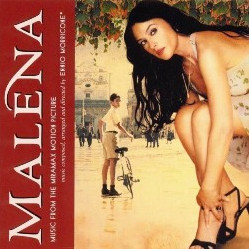Original Review by Jonathan Broxton
Ennio Morricone’s fifth and final score of 2000 is for the Italian romantic-comedy-drama Maléna, directed by Giuseppe Tornatore, for whom Morricone has written several classic scores, not least the incredible Cinema Paradiso. What’s interesting about Maléna is the fact that, unlike 99% of Morricone’s output of late, it has been the recipient of quite a bit of publicity, mainly through its association with the Miramax marketing machine. A second Golden Globe Best Score nomination in a row has been secured for the Italian maestro – following his success with The Legend of 1900 last year – and is backed up by a high profile soundtrack release. The only difference between this and 1900, though, is that Maléna is worthy of the praise.
To quote from the Miramax press kit, Maléna is a film about a beautiful young widow who inspires a young boy’s independence and courage amongst the chaos and intolerance of war. The film stars Monica Bellucci (recently seen in Under Suspicion) as Maléna Scordia, the most ravishing woman in a sleepy Sicilian village, whose husband is away fighting in World War II. Attracting lustful glances from the men of the town, being the recipient of scornful gossip from their jealous wives, and followed wherever she goes by children on bicycles, Maléna thinks her life could not get any more difficult – until news reaches her that her husband has been killed in action. But solace comes from an unexpected place: one of the children who follow her, young Renato Amoroso (Giuseppe Sulfaro), decides to help Maléna through her suffering, and becomes her “secret shadow”, ensuring that the classical beauty is able to come to terms with her loss, and with the narrow-mindedness of her neighbors.
Despite his recognized talent as a composer in the romantic and dramatic genres, eccentric comedy music has also always been one of Morricone’s fortes – as the music in cues such as ‘Hypocritical’, ‘Walks in the Town’, ‘People’s Whispers’ and the highly rhythmic ‘Orgy’ suggest. The tenderness of an acoustic guitar and the warmth of the string section vie for attention with a surprisingly jovial brass section in oompah-band time, and a series of oddly-metered descending phrases that bounce around the woodwinds and swirl away into nothingness. These cues are obviously intended to depict Maléna’s life in her Italian village, as she goes about her business while being stared at, whispered about, and pursued by hordes of kids. The irony and downright peculiarity of Maléna’s plight is perfectly summed up by Morricone’s off-kilter comedic sensibilities.
The music that will remain in the heart longest, though, are the ones that concern pure, unadulterated romance – cues such as ‘Maléna’ and the especially the extended ‘End Titles’ simply ooze grace and charm and beauty, in a manner not dissimilar to the sounds heard in, and the aforementioned Cinema Paradiso – there’s a longing, unrequited quality in the solo viola and solo flute performances that breaks the heart. The solo viola is also present in other cues, notably ‘In the House’, adding a depth and resonance to the music, while ‘Sex Thoughts’ features an attractive, moody trumpet and saxophone duet playing a sultry variation on the comedic theme.
In addition to these, two other cues stand out from the others for their total uniqueness: ‘Lynching’ is one of Morricone’s rare pure action cues, a dangerous-sounding, throbbing sequence of moody percussion ostinatos and surprisingly violent orchestral dissonance that is quite unlike anything I have heard from Morricone, at least in any of his mainstream works. At completely the other end of the musical spectrum is ‘Movie of Other Times’, Morricone’s personal affectionate homage to the Golden Age of film scoring, where he intentionally apes the composing styles of Max Steiner, Alfred Newman and others in a cue which seeks to illustrate little Renato’s love of the cinema.
In a year in which Morricone has written scores as brilliant and diverse as Mission to Mars, Vatel, Canone Inverso and Maléna, surely the time has come for him to be acknowledged by his peers on an international level. Despite having two Golden Globe wins (and further a nomination for this score), some sort of recognition from the Academy Awards is surely long overdue. Maléna could well be the score to buck the trend – especially with the Miramax marketing machine at its back. Whatever the case, Maléna is a special score, and is indicative of the great things European film music has to offer.
Note: The CD being reviewed here is a special Oscar promo of the score, produced for the American premiere of the film, and which was distributed to those who attended. A “proper” release, on the Virgin label, and with two extra tracks, is being released on February 4th 2001.
Rating: ****
Track Listing:
- Inchini Ipocriti E Disperazione/Hypocritical (2:02)
- Maléna (2:35)
- Passeggiata In Paese/Walks in the Town (3:15)
- Visioni/Vision (3:24)
- Nella Casa/In the House (2:14)
- Maléna (End Titles) (4:23)
- Linciaggio/Lynching (2:44)
- Orgia/Orgy (1:11)
- Il Ritorno/The Return (1:46)
- Bisbigli Della Gente/People’s Whispers (2:40)
- Altro Casino/Another Casino (2:15)
- Visione (Fantasie D’Amore)/Vision (Love Fantasies) (2:14)
- Cinema D’Altri Tempi/Movie of Other Times (3:37)
- Ipocrisie/Hypocrisies (1:59)
- Pensieri Di Sesso/Sex Thoughts (2:27)
- Momenti Difficili/Difficult Moment (4:23)
Running Time: 42 minutes 19 seconds
Virgin (2000)
Music composed, conducted and orchestrated by Ennio Morricone. Recorded and mixed by Fabio Venturi. Album produced by Ennio Morricone.












